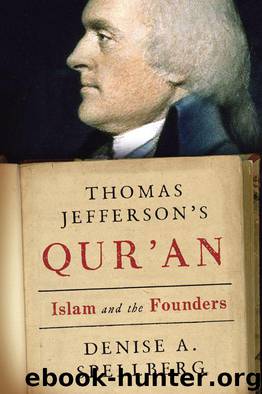Thomas Jefferson's Qur'an: Islam and the Founders by Denise A. Spellberg

Author:Denise A. Spellberg [Spellberg, Denise A.]
Language: eng
Format: epub
Tags: History, United States, General, Political Science, Civil Rights, Religion, Islam
ISBN: 9780385350532
Google: Rzxlz64cRiUC
Amazon: B00C8S9XP0
Publisher: Knopf
Published: 2013-10-01T23:44:45.270038+00:00
JEFFERSON’S TREATY WITH TRIPOLI AND THE QUESTION OF ISLAM, 1806
Religion had never figured previously in Jefferson’s diplomatic dealings with North African states, but the language of his treaty with Tripoli, compared with that of Adams’s previous treaty, indicates that religion had entered into his thinking. Article 14 of Jefferson’s Tripoli treaty, for instance, omits the clause Cobbett had complained about in Adams’s earlier Article 11: “the government of the United States of America is not in any sense founded on the Christian Religion.”105 It is curious that Jefferson would have chosen to exclude mention of a principle of government that he had actively championed since 1776, but perhaps attacks upon his Christianity during the presidential election moved him toward reticence to avoid further conflict. He did, however, choose to retain and thus reaffirm Adams’s end to anti-Islamic sentiments concerning America’s official stance toward the beliefs of Muslims: “As the Government of the United States of America has in itself no character of enmity against the Laws, Religion or Tranquility of Musselmen.”106 Whatever Jefferson’s calculations, the treaty was signed on June 4, 1805, in Tripoli and ratified by the U.S. Senate on April 17, 1806, by a vote of twenty-one to eight.107 When it was published in various newspapers across the land, no outcry was heard, nor did Federalists renew their attack on Jefferson as being an infidel Muslim. He had after all only retained language that the unimpeachably Christian Adams had approved.
Unlike Adams’s treaty, which contained no Arabic equivalent for this language about Islam and Muslims, Jefferson’s Arabic version reflected these ideas accurately.108 As a result of his naval action, however, Jefferson’s treaty could no longer claim that the United States had never entered “into any war or act of hostility against any Mehomitan nation.”109 Language was therefore inserted to make military intervention seem less belligerent: “and as the said States never have entered into any voluntary war or act of hostility against any Mahometan Nation, except in the defence of their just rights to freely navigate the High Seas.”110 The United States might not have declared war on Tripoli, but it justified its use of force as a principled effort to reclaim the right to “freely navigate” the Mediterranean. To emphasize this point, Jefferson’s version included, with minor variations, another clause from Adams’s: “It is declared by the contracting parties that no pretext arising from Religious Opinions, shall ever produce an interruption of the Harmony existing between the two Nations.”111
With these words, Article 11 of the first Tripoli treaty concluded, but Jefferson’s Article 14 continued with new language about the freedom of religion, whose exercise was to be permitted the representatives of both nations—and their slaves: “And the Consuls and Agents of both Nations respectively, shall have liberty to exercise his Religion in his own house; all slaves of the same Religion shall not be impeded in going to said Consuls house at hours of Prayer.”112 This reciprocal guarantee was of course a constitutional, if not practical, reality in America.
Download
This site does not store any files on its server. We only index and link to content provided by other sites. Please contact the content providers to delete copyright contents if any and email us, we'll remove relevant links or contents immediately.
| Buddhism | Christianity |
| Ethnic & Tribal | General |
| Hinduism | Islam |
| Judaism | New Age, Mythology & Occult |
| Religion, Politics & State |
Cecilia; Or, Memoirs of an Heiress — Volume 1 by Fanny Burney(31332)
Cecilia; Or, Memoirs of an Heiress — Volume 3 by Fanny Burney(30934)
Cecilia; Or, Memoirs of an Heiress — Volume 2 by Fanny Burney(30889)
The Secret History by Donna Tartt(16622)
Sapiens: A Brief History of Humankind by Yuval Noah Harari(13052)
Leonardo da Vinci by Walter Isaacson(11901)
The Radium Girls by Kate Moore(10907)
Sapiens by Yuval Noah Harari(4536)
The Wind in My Hair by Masih Alinejad(4424)
How Democracies Die by Steven Levitsky & Daniel Ziblatt(4398)
Homo Deus: A Brief History of Tomorrow by Yuval Noah Harari(4278)
Endurance: Shackleton's Incredible Voyage by Alfred Lansing(3840)
The Silk Roads by Peter Frankopan(3759)
Man's Search for Meaning by Viktor Frankl(3631)
Millionaire: The Philanderer, Gambler, and Duelist Who Invented Modern Finance by Janet Gleeson(3568)
The Rape of Nanking by Iris Chang(3516)
Hitler in Los Angeles by Steven J. Ross(3435)
The Motorcycle Diaries by Ernesto Che Guevara(3332)
Joan of Arc by Mary Gordon(3257)
